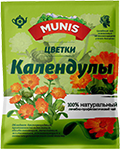Tea Munis «Calendula»
BASIC PROPERTIES
Healing calendula flowers have bactericidal, anti-inflammatory, analgesic, diuretic, choleretic, sedative and antihypertensive properties. It is used for gastroenterological, cardiovascular, nervous and gynecological diseases. Used for rinsing with inflammation of the ENT organs.
DETAILED DESCRIPTION
Composition of Calendula tea:
Green tea, calendula flowers.
Characteristic:
Calendula flowers contain about 3% carotenoids (carotene, lycopene, violaxanthin, citraksanthin, rubixanthin, flavochrome), flavonoids (narcisin, ramnetin, isorhamnetin-3-triglucoside, isoquercitrin and others), essential oil (about 0.02%), saponins, calendene bitter substance, resinous substances (up to 3.44%), tannins, mucus (up to 2.5%), inulin, organic acids (malic, salicylic, pentadecyl), phytosterol, enzymes, vitamin C, alkaloids.
Useful properties of calendula:
They have anti-inflammatory, wound healing, bactericidal, antispasmodic, expectorant, diuretic and choleretic effects, accelerate the processes of tissue regeneration. When used internally, they contribute to the regeneration of the mucous membranes of the stomach and intestines, accelerate the healing of ulcers and erosions, exhibit a sedative, mild hypotensive effect, and contribute to the normalization of cardiac activity.
Calendula helps with coughs, bladder stones, spleen diseases and stomach cramps. In gynecology, it is used as a douche for cervical erosion.
The benefits of calendula are so great that it is used in the treatment of malignant tumors, fever, baldness and inflammation of the sciatic nerve. She treats mastitis, conjunctivitis and pustular diseases.
Calendula flowers are recommended:
As an infusion, calendula herb is used:
- for cough, sore throat, laryngitis, acute respiratory infections;
- in the complex treatment of erosive gastritis, enterocolitis, colitis, peptic ulcer disease;
- for diseases of the liver and biliary tract;
- for heart disease and hypertension;
- for insomnia, nervous excitability, as well as during menopause;
- for cervical erosion, menstrual disorders and in the postpartum period.
For external use:
- rinsing the mouth and throat, with tonsillitis, stomatitis, gingivitis;
- instillation in the ear, with purulent otitis media;
- in the form of enemas for paraproctitis and proctitis;
- douching with thrush, erosion, colpitis, delayed menstruation.
 |
Release form: Preparation method: Recommendations for use: |
Acceptance period:
According to the indicators.
Contraindications:
- homiladorlik;
- gipotenziya;
- individual intolerans.
Expiration date:
In a dry and cool place, within 2 years.
